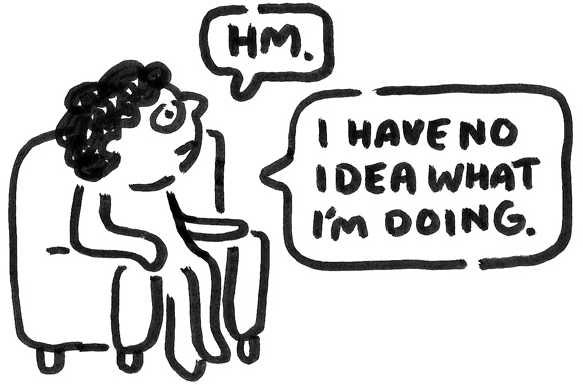How Smart Are You, and How Would You Know? ($)
No one is average, and no one's problems are the same. Being unsure of yourself is a healthy attitude.
“I know that I am intelligent because I know nothing.” — Socrates
Does Intellect Make You Smart?
This has to be one of the more useless statements ascribed to Socrates. But then, Socrates never wrote anything down, so whatever “Socrates said,” is being said by someone who isn’t secure enough to say it themselves.
We’re told that Plato spoke for Socrates, and that Plato is no slouch, but who knows Yesterday’s Plato may have been today’s Tucker Carlson. According to Peter Kingsley (1999), there was a lot of horse trading going on in Greece in the age before Christ.
Regardless of how arrogant or humble we might appear, each of us is obliged to act on what we strongly feel. This brings us back to the question: how smart are you? Most of us answer that question by deferring to authority our judging our success. But success is more of a reflection of the environment in which you operate than it is an indication of the depth or breadth of your skill.
We look to certification, education, or success to substantiate a person’s authority. This may be the wrong thing to do because authority represents enforcement or consensus, not knowledge or insight. My answer is that a person’s experience is the best indicator of their skills and intelligence. Having a good intellect does not make you smart.
The Dunning-Kruger Effect
The Dunning-Kruger effect refers to the tendency of poorly informed people to overestimate their insight, and well-informed people to under-estimate theirs. The result is that the majority of people who speak out are the poorly informed. It also means consensus—or what's being contested—is most readily established by those who have something to agree on, which is most likely the people who are poorly informed.
In addition, those who know best are reluctant to speak out. They do not make a majority and rarely establish a consensus.
Dunning-Kruger reminds us that the more you know, the more uncertain you are likely to be. This is not a simple contradiction. It does not mean that the more you learn, the less you know. It means the more complexity you appreciate, the less simplicity attracts you.
You can know the value of your ability without being certain of your conclusions. The real question is not “smart or not smart,” it’s one’s ability to make progress.A trivia expert can sound smart, but a good memory doesn’t make a person capable. It depends on problem. The solution to an unusual problem won’t depend on a good memory.
Some people are good problem solvers. It’s a skill but, it doesn’t mean you’re smart. Problems are like puzzles. If you know the tricks of that particular trade, then you’ll be a better problem solver. Some tricks can be learned by rote, but fully solving problems in context takes experience.
I like complex problems, and the problems people bring to me are not simple. The most common elements in the problems brought to me are repetition and inflexibility. There are good reasons for these patterns, but they play an obvious role in causing problems.
People say, “It’s this way because…” or “I do this because…” and right there is the obstacle, staring everyone in the face. It’s obvious to everyone, and pointing it out doesn’t solve the problem, but it provides a path to the problem’s root.
The path of flexibility is the path that people don’t want to take. People suffer emotional problems because they won’t change what they consider to be their reasonable attitude.
There is another type of problem: the disguised problem. Disguised problems are unusually reasonable. They make it absolutely clear that some other party is the cause. The conflict is clearly in the spotlight.
What is hidden are the underlying interests and the true motivations. Like a proxy war, there is conflict, combatants, and a battle front, but they represent a deeper conflict over deeper issues. For people who bring these sorts of issues, there are really two problems: the first is for them to see through the problem they’re creating—and they don’t want to—and the second is to confront the real problem that underlies it. They want to confront that problem even less!
Here is where “being smart” becomes ambiguous. The smart person finds a different solution by recognizing a different problem, but this will not win the proxy war being fought on the surface. This surface war might be their crumbling relationship, or their lack of success.
The real problem is a deeper conflict, it’s a conflict that a person is having with themselves. They cannot grasp this until they reformulate their conflict. Their problem is with themselves.
I often see quite a different picture when I look behind the curtains, but those in struggle typically don’t want me to, and will not consider an alternative. We are defined by the story we tell ourselves, and we cling to those stories for many reasons.
The reason usually comes down to fear and pain: “Better the devil that you know than the devil you don’t,” as the saying goes. This means people would rather continue to fight the endless war they’re familiar with, conceived as something outside themselves and from which they have built protective battlements, than place themselves in serious risk of losing their self-esteem, with no protection and an uncertain outcome.
To excel with uncertainty, contact me. Short calls are free.
https://www.mindstrengthbalance.com/schedule15
Common versus Average
Most of us deal with common problems. Most of these are not as common as they appear, and they’ll have uncommon solutions. Our uncommon solutions will be particular to us. They won’t be well known or understood, and we won’t find much help with them. People come to counselors like me with their uncommon problems.
Dealing with common problems and living a common life is not the same as average. Average is a concept that can be measured. Common is a judgement that people agree on. We confuse the two. Many people live common lives with common problems; no one is average, and I have yet to see an average problem.
Average is a mathematical construct that I find to be largely useless. Allopathic medicine uses averages to diagnose and prescribe, which is why allopathic medicine rarely works for non-average people, and why allopathic medicine doesn’t work for mental health.
Imposter Syndrome Can Be A Good Thing
“Talent hits a target no one else can hit; genius hits a target no one else can see.”
— Arthur Schopenhauer
Keep reading with a 7-day free trial
Subscribe to Stream of Subconsciousness to keep reading this post and get 7 days of free access to the full post archives.





